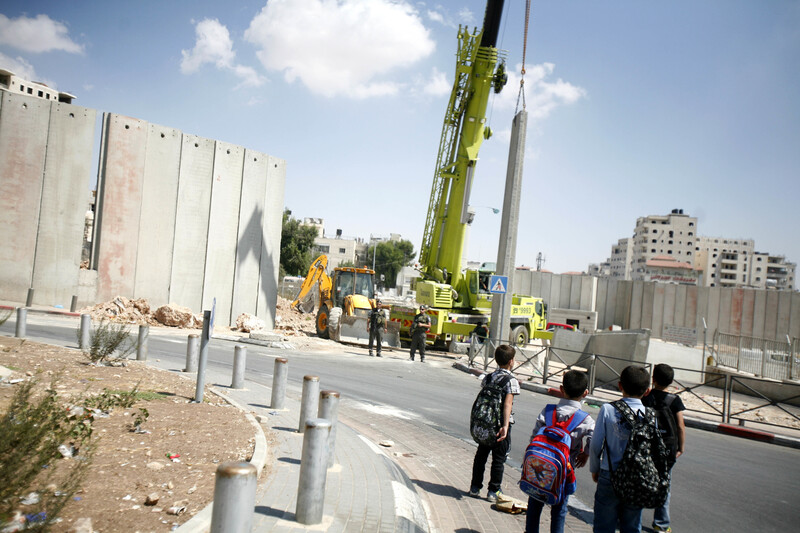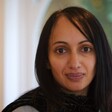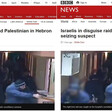Media Watch 17 December 2015

A separate and unequal reality for Palestinians in “united” Jerusalem.
APA imagesThe BBC’s reporting on Jerusalem does not always align with reality or the city’s status under international law.
In October, its diplomatic editor Mark Urban called Jerusalem “Israel’s capital” during a broadcast of the current affairs program Newsnight.
Discussing Israel’s installation of new checkpoints around Palestinian areas in the city, Urban said: “This evening, there were signs of a more permanent setting up of checkpoints around Palestinian villages. A kind of division within Israel’s capital that its leaders have long wanted to avoid, but which this crisis has now prompted.”
As the BBC’s diplomatic editor, Urban must surely be aware that there are no foreign embassies in Jerusalem, either East or West.
Reality
There’s a reason why that is so: in accordance with international law, no country recognizes Jerusalem as Israel’s capital.
International law considers only West Jerusalem, conquered in 1948 — amid the expulsion by Zionist militias of tens of thousands of Palestinians — to be under de facto Israeli control, while East Jerusalem, conquered in 1967, is occupied territory.
This is reflected in the UK government’s position, which, since 1950, has recognized Israeli de facto authority in West Jerusalem, but not sovereignty, and considers East Jerusalem to be under military occupation.
But in the Newsnight broadcast, Urban failed to make any distinction between occupied East Jerusalem and West Jerusalem, echoing Israeli propaganda depicting the city as its eternal and undivided capital.
Urban also claimed, despite all evidence to the contrary, that Israel’s leaders have “long wanted to avoid” division in Jerusalem.
Has he not seen Israel’s apartheid wall which surrounds Palestinian neighborhoods in East Jerusalem, or the settlements for which Israel pushes Palestinians out of their homes?
“Correction” heaps on more misinformation
After the Palestine Solidarity Campaign drew attention to Urban’s false claims, the BBC issued a short statement on its Corrections and Clarifications web page and published an even briefer message on Twitter.
The statement reads: “In a report from Israel, Mark Urban referred to Jerusalem as ‘the nation’s capital.’ Although Israel claims the city as its capital, this claim is not recognized internationally and East Jerusalem is considered to be occupied territory.”
Urban had in fact been reporting from East Jerusalem, which is Palestinian territory, not Israeli, so the BBC’s attempted clarification of the original misinformation only succeeds in disseminating more.
It draws attention, once again, to the BBC’s inability or unwillingness to recognize international law regarding Jerusalem.
In 2013, the Palestine Solidarity Campaign challenged the BBC over references made by its journalists, including Middle East correspondent Kevin Connolly, to Jerusalem as an Israeli city.
The BBC Trust responded that news reports were justified in referencing Jerusalem as an Israeli city based on advice from senior editorial advisor Leanne Buckle.
In an email to the Palestine Solidarity Campaign, the Trust wrote: “The adviser [Buckle] acknowledged that Israel’s sovereignty over the whole of Jerusalem was not recognized under international law. However, she considered that Israel had de facto control over the entire city in a political, administrative and military sense. She also noted that Jerusalem was administered as a single entity by the Jerusalem municipal authority which made no distinction between East and West.”
What it boils down to is that Israel considers Jerusalem to be Israeli, so the BBC will do the same, ignoring the rights of Palestinians under international law.
Dishonest and inaccurate
This kind of dishonest and inaccurate reporting on Jerusalem, which the BBC Trust fought to maintain in 2013, continues to afflict its coverage.
An October article on the BBC’s website asks: “Is Palestinian-Israeli violence being driven by social media?”
A section added to the Q&A since its initial publication is headed: “What is the East Jerusalem connection in all of this?”
In it, the BBC paints a rosier picture of life for Palestinians in East Jerusalem than the reality.
“There are about 300,000 Palestinians in East Jerusalem, all of whom have so-called ‘permanent residence’ status, meaning they can live and work in Israel and, inter alia, receive the same social benefits and health insurance as Israelis,” the BBC states. “They can apply for full citizenship, but most have chosen not to, preferring not to recognize Israeli sovereignty.”
The reality is that Palestinians in East Jerusalem are forced to apply for residency permits, which must be frequently renewed. The conditions for application are so draconian that many Palestinians who have never lived anywhere but East Jerusalem, and whose family history in the city goes back generations, have had their residency permits revoked and were forcibly transferred from the city.
Between 1967 and 2013, Israel revoked the residency permits of more than 14,000 Palestinians in East Jerusalem.
Palestinians who do remain in East Jerusalem pay high taxes to Israel but receive limited and inadequate services in return.
Despite this reality, the BBC implies again that Jerusalem is an undivided city by stating in the Q&A: “Palestinians want East Jerusalem as the capital of a future state, but Israel says the city will never again be divided.”
It seems the broadcaster is unwilling to learn from its mistakes.
A year ago, its website used maps which showed Jerusalem as being wholly inside Israel. Complaints from the Palestine Solidarity Campaign forced the BBC to redraw the maps and move the city back towards its actual position, with the western part in Israel and the eastern half in the West Bank.
Despite the constant complaints and reminders of the facts, the BBC continues to misreport and misinform on Jerusalem — to Israel’s benefit.






Comments
various districts of Jerusalem are completely cut off
Permalink George replied on
How can it be an undivided city if Israel has a check points or even a prison wall running through various localities like Beit Hanina, Al-Tur, Jabal Al Mukabber? In some cases these areas have become part of w. Bank although they still have to pay city tax to Jerusalem. In other cases they are just cut off from the remaining city. Tourists who visits Jerusalem may not notice but residents know full well.
Mant of us would like to be
Permalink Jax Agnesson replied on
Mant of us would like to be able to trust the BBC to be impartial. In this particular area, (Israel/Palestine) words are important, and political territorial distinctions are critical. It is right to insist that the BBC pays scrupulous attention to such 'details'.
It's not just BBC, but Google as well
Permalink STH replied on
Check this out: https://productforums.google.c...
Also, Salon did a recent write up of this. http://www.slate.com/articles/...
This is fascinating, because earlier this year Google showed Jerusalem as being in Palestine. This suggests a policy change rather than an algorithmic result.
http://jewishbusinessnews.com/...
What accounts for this sudden change? Electronic Intifada, could you do some more investigations into why Google does this? Is it a new policy of theirs, and if so, what factors went into this decision?
BBC bias
Permalink John Strover replied on
I hope that the whole of Ameena Saleem's blog has been presented to the BBC in the form of a complaint. If it hasn't is there no way it could be? Is there any way individuals can back such a complaint?
The State of Palestine exists
Permalink Walk Tall Hang Loose replied on
The BBC say "Palestinians want East Jerusalem as the capital of a future state". But the State of Palestine was declared and recognized in 1988: the same process that created the State of Israel. Today Palestine is recognized by 195 other states, and is an observer state at the United Nations. It exists now, although its territory is under occupation by Israel.
Palestine's Declaration said that it is established "in our Palestinian territories" and that its capital is Jerusalem. During the Oslo process, and in the interests of peace, Palestine has said that it would accept a territorial settlement which conceded to Israel the territory, outside the partition plan borders, that Israel captured in the 1948-49 war, including West Jerusalem. This would leave Palestine with the West Bank and Gaza, and East Jerusalem for its capital. Since these huge concessions have not produced a peace agreement, they are not binding on Palestine. The question of Jerusalem is still to be decided. There are no grounds on which Israel could claim sovereignty over East Jerusalem.
In my view, if there is a two-state solution, and taking into account that both sides claim Jerusalem as their capital, it should come under joint sovereignty.
Disinformation in clarification?
Permalink Einar Steinn Valgarðsson replied on
While the inital reporting was certainly wrong and was rightly criticized, I fail to see any factual errors in the following clarification, let alone disinformation: “In a report from Israel, Mark Urban referred to Jerusalem as ‘the nation’s capital.’ Although Israel claims the city as its capital, this claim is not recognized internationally and East Jerusalem is considered to be occupied territory.”" Can someone point out to me what exactly is incorrect in this statement?